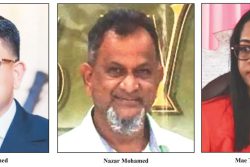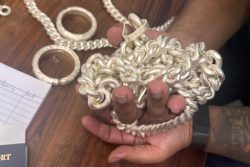The Suriname fishing licences are back in the news again with President Irfaan Ali telling a public meeting in Crabwood Creek last week that he was “dissatisfied with the situation.” Ever the optimist he went on to assure his listeners that Guyana had been promised that a “solution” would be proposed at the next joint commission meeting, and that President Chandrikapersad Santokhi had said they were “working on some options to give us.” What form that ‘solution’ might take is a matter for pure speculation, since everyone on this side of the Corentyne is of the conviction that we already have a ‘solution,’ and all that is needed is for Suriname to implement it.
Guyanese fishermen complained for many years about harassment in one form of another, including from the Suriname Coast Guard which would seize their boats and require them to pay a fine before they could get them returned. The Guyanese could get licences, but these were obtained indirectly. Surinamers mostly based in Nickerie who did not go out to fish themselves would buy official annual fishing licences for US$50. They would then rent these to Guyanese fishermen for US$2,500 and US$3,000. Since 2021, however, the price has risen dramatically, and this newspaper was told that in 2023 they were costing between US$4,000 and US$6,000.
Nowadays most of the fishers who used to have licences either cannot afford them or are restricted because of new processing issues.
According to a chronology of events issued by our Ministry of Foreign Affairs in 2022, the matter was first discussed at a presidential level in 2020, and then in November of that year Guyana requested that Suriname issue 150 licences to our fishermen to fish offshore Suriname. Paramaribo agreed unofficially to grant the licences and said that a government-owned company would be set up which would oversee the registration of the Guyanese vessels, and that the fishermen would then sign a “vessel-basing agreement” with it in accordance with Suriname regulations. Needless to say no one has heard anything more about a company being set up.
Suriname also proposed a Fisheries Agreement which would deal with the issuing of licences, and pursuant to that its Ministry of Agriculture asked for the names of the middlemen from whom the Guyanese obtained their licences. This was eventually supplied by the fishermen, albeit with some reluctance. The discussion continued in good faith, said the Minis-try, and the issue was taken up by Presidents Ali and Santokhi when they met in Georgetown in August 2021.
The Joint Communiqué issued by the two Presidents following their discussions included the commitment “that both ministers responsible would work towards the issuance of fishing licences in that category by January 1, 2022, keeping in mind the established quota on the Surinamese side.” Subsequent to that, however, nothing more was heard from across the Corentyne.
Takuba Lodge then recounted how several months later Minister Hugh Todd wrote a letter in December 2021 to his Surinamese counterpart reminding him of the matter. He received a response suggesting that the Ministers of Agriculture should convene a meeting on January 13, 2022 in order to reach an agreement. The meeting never materialised. However there was a tripartite summit involving Guyana, Suriname and Brazil later that same month when the licences came up for discussion again, although nothing emerged from that encounter either.
The bottom line of this story is that while the Government of Guyana has interpreted the Joint Communiqué of 2021 as a firm commitment, the Government of Suriname has not. The phrase indicating they were ‘working toward’ the issuance of the licences has given them latitude it seems, to extend the time-frame for as long as they wish. There are various points to be made in connection with this, and the first is that an unknown number of Surinamers have been making money off Guyanese in relation to the sale of licences for years. Based on what the fishermen themselves have told this newspaper, the profits sound very substantial indeed, since the charges have to be paid in US$.
It does not take any imagination to work out that the resistance to any change in these arrangements, whatever President Santokhi himself might want, will be substantial and sustained. It might be added that ever the diplomat, Vice President Bharrat Jagdeo did not improve relations when he made a suggestion about corruption on the Suriname side in respect of the sale of licences. This was an allegation which went down in Paramaribo with all the daintiness of a slab of concrete landing in the herbaceous border.
It has to be remembered too that this is taking place under a government which does not exert the kind of control over the society that the PPP does in Guyana. All governments which come to office in Suriname are coalitions, and on this side of the Corentyne one simply does not know in terms of political affiliation who owes what to whom.
Mr Jagdeo also wryly remarked one day that Suriname’s Minister of Agriculture seemed to be more powerful than the President. If one were to take him seriously, that would be to assume that the Minister is acting in defiance of his superior, but that might not be the case; there may be political reasons why the government will not take on the licence renters. One would hope that Guyana’s embassy in Paramaribo is doing its job of explaining to Georgetown what the political intricacies of Suriname politics are.
There is too the latent problem which underlies all discussions about agreements with Suriname, all of which, with one exception, never seem to come to fruition. That of course is the boundary issue. Traditionally Suriname has always resisted anything which appears as a concession to this country, no matter what the nature of the agreement. Of course that was in the days when Guyana appeared so much weaker than her eastern neighbour, but now the roles have suddenly been reversed. One doubts, however, that this will make any difference to Surinamese attitudes to this country, and it may be that President Santokhi could never sell a licensing agreement relating to Guyanese fishermen to his electoral base.
Be that as it may, President Santokhi told the Sunday Stabroek in March this year that the matter was still on the “agenda,” and that his government was not running away from its responsibility to make a “proper decision.” He added that on the Suriname side there were some “legal issues” in need of amendments, but based on all the information “we will get on both sides, then we can see what kind of decision will be the best decision.”
President Ali should not be holding his breath.






